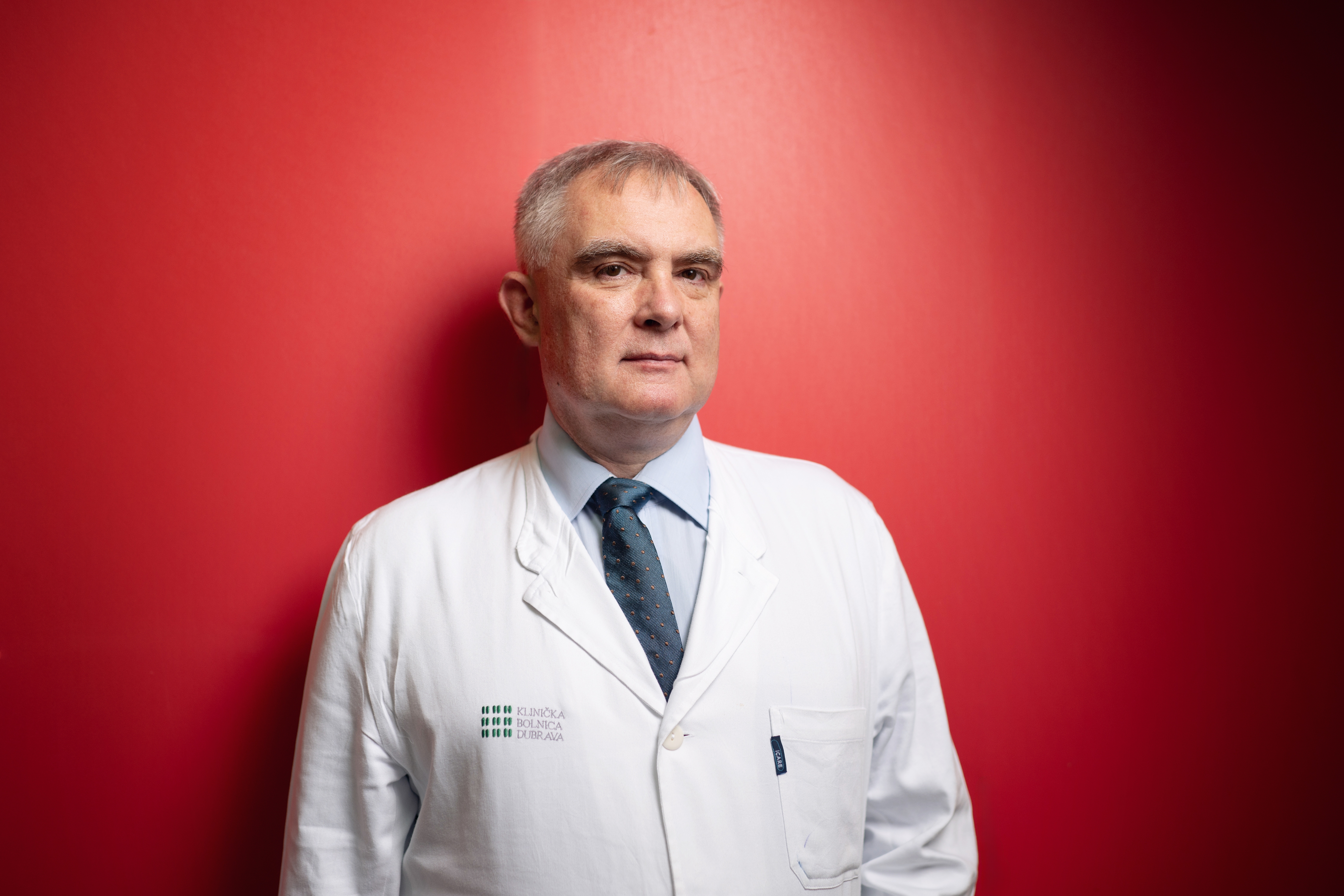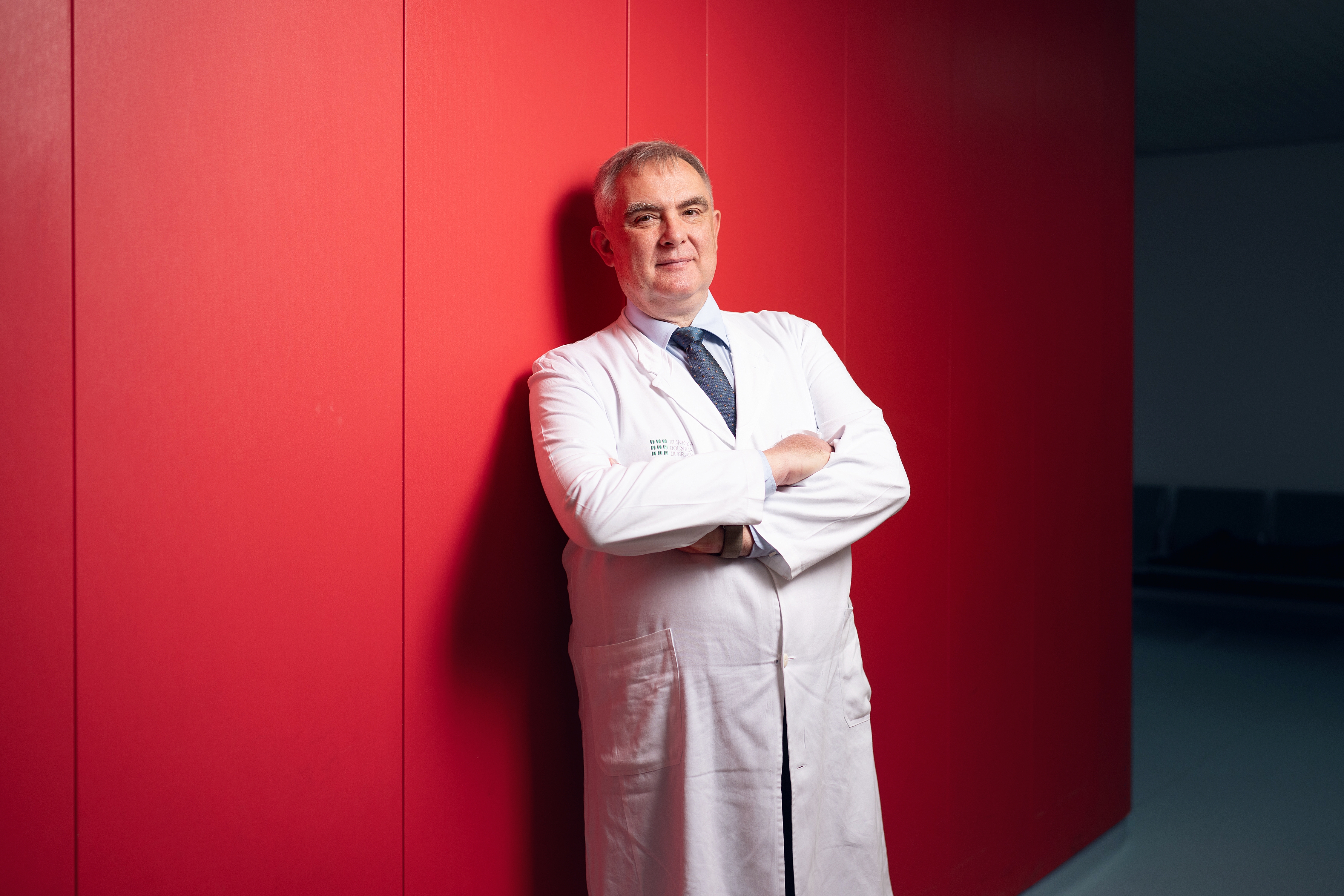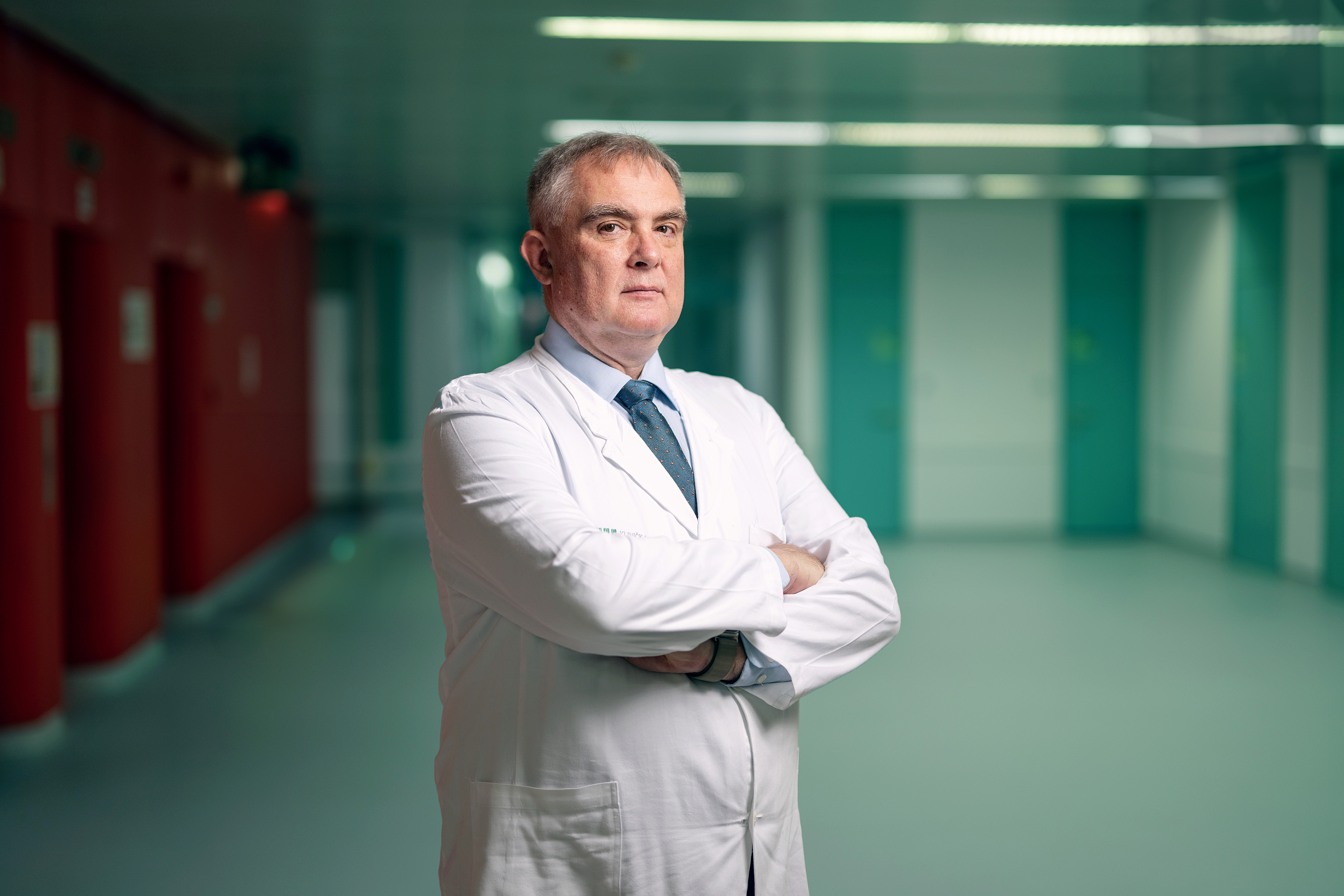The top plastic surgeon does not feel pressure even when the patient's life is in his hands: 'The operating room gives me peace, and my knowledge reduces stress'
Although he is better known abroad than here, the reputation of prof. Rado Žic, head of the Clinic for Plastic Surgery KB Dubrava, is well deserved
He particularly remembers the case of a nine-year-old girl, whose leg was caught and crushed by a conveyor belt on a school trip. "After a terribly difficult operation, I was invited to school near Križevci. The children thanked me with a beautiful song. What could be more beautiful than that?'
Prof. Dr. Rado Žic, head of the Clinic for Plastic, Reconstructive and Aesthetic Surgery of the Dubrava Clinical Hospital in Zagreb, recently returned from Ethiopia. With two surgeons each from the Czech Republic and Austria, he performed very complex reconstructive procedures in two weeks on six patients whose entire upper arms were destroyed in combat operations. However, their muscles and nerves were not damaged, so their hands had full function.
"That's why we transferred the bones from the lower legs and installed them using screws and plates in the upper arms. Then we connected their blood vessels with a microsurgical procedure." In total, in 15 days, working from 8 a.m. to 11 p.m., they performed another 20 microsurgical operations.
The stay in Ethiopia reminded Professor Žic, a specialist in general, plastic reconstructive and aesthetic surgery, of the days of the Homeland War spent in the war hospital in Tomislavgrad and his specialization at the KBC Zagreb Surgery Clinic, where he assisted two of our greatest plastic surgeons, professors Zdenko Stanec and Iva Dzepini. "At that time, there were a lot of wounded people who had to undergo various microsurgical reconstructions. We performed about four hundred such operations, and I participated in about 350 of them."
A turnaround in the treatment of war victims
He points out that they have completely reversed the war doctrine. "Until then, war wounds were bandaged for months, they were covered in the simplest way, and reconstructions were done later, that is, secondary. We, on the other hand, immediately removed the dead tissue and performed the reconstruction immediately." According to Professor Žic, Professor Marko Godina, a brilliant plastic surgeon from Ljubljana who received his doctorate in Zagreb and from whom plastic surgeons learned the doctrine of radical debridement and early reconstruction, is most deserving of such an approach.
Also, Slovenian doctor Zora Janžeković, who graduated from the Faculty of Medicine in Zagreb, and after that worked in the Varaždin Hospital and the Clinical Hospital in Maribor. She made a real medical miracle and the biggest breakthrough in the treatment of burns at the world level when she started treating burns with her own original method.
It is called early tangential burn excision and immediately covered the exposed surface with free skin grafts. Because of this method of treatment, patients with burns had a greater chance of survival and less functional consequences. That is why she was the most cited doctor in the former state.

Pioneers of European microsurgery
Professor Žic recalled a complex operation when Professor Stanec, whom he assisted, reconstructed the hand of an HVO general. "That hand was cracked, part of the tissue was missing, and the fingers were non-functional. First, we reconstructed the bony part of the hand with a free flap, and then we transferred the tendons from the leg to the arm. That hand is still functional today, although it was destroyed."
He also told how he assisted Professor Dzepina, who, together with Professor Stanec, reconstructed the heel. "Before the operation, everyone claimed that such an operation could not succeed, and that it was best to amputate the leg immediately. However, that patient still walks normally today."
Professor Žic repeatedly pointed out that thanks to top plastic surgeons Stanec, Džepina, Radojko Ivrlač and Davor Hulina, microsurgery was among the first in Europe to take root in Croatia.
The crucial importance of good mentors
After the end of the war, Professor Stanec and the then young doctor Žic from KBC Zagreb moved to the former Military Hospital in Dubrava. They later founded the Clinic for Plastic and Reconstruction Surgery there. To this day, the Clinic is one of the leading European institutions for plastic, reconstructive and aesthetic surgery, breast surgery and hand surgery.
In addition to being a great surgeon, Professor Žic notes, Professor Stanec helped young doctors a lot. "He sent us abroad to study and improve, and in addition he let us work and encouraged us to be independent. I still apply this learning principle in my work today. I give young people a chance, because if they only assist, they will not develop their potential. To the assistants, I first move to the edge of the table, and then I leave the room and tell them that they can always call me if needed."
He says that his greatest wish is for five doctors to remain at the Clinic who will know how to work better than him. Thanks to such a transfer of knowledge, today the Clinic for Plastic Surgery KB Dubrava is known even outside the borders of Croatia.

Better known abroad than at home
Professor Žic says that in the German-speaking world breast surgery is performed by gynecologists who are not trained in reconstruction, so their results are not the best. "In our country, thanks to the doyen of plastic surgery, academician Ivan Prpić, these procedures are performed by plastic surgeons. That is why we also receive patients from abroad who are not satisfied with the procedures because they were not performed as they should be. Given that there are more options and techniques for breast surgery, we collaborate with patients and respect their wishes whenever possible."
At the Clinic, among other things, they introduced the omega incision, which is used for all procedures on the breast, from biopsy to reconstruction, and they were the first in the world to introduce the method of sparing the nipple in breast cancer surgery into a regular procedure. They also applied a new technique for skin reduction, and this technique is now accepted in the world.
Due to his successes, as well as the achievements of the Clinic, Professor Žic, his colleagues agree, is today better known abroad than at home. Among other things, he was the secretary general and president of ESPRAS (European Society of Plastic, Reconstructive and Aesthetic Surgery), president of the Accreditation Committee of EBOPRAS (European Board of Plastic, Reconstructive and Aesthetic Surgery), president of the Croatian Plastic Society, reconstructive and aesthetic surgery, member of the editorial board of the European Journal of Plastic Surgery... Next year he will be appointed president of EBOPRAS, where he is now vice president.
Love for the last general surgery
Professor Žic was educated in Switzerland, Germany, Austria and Britain, where he had the opportunity to work with world-renowned plastic surgeons such as professors Neven Olivari, Milomir Ninković, T. C. Teo, Mark Pickford and Velimir-Josef Novak.
However, Professor Žic was close to becoming a cardiac surgeon. As a student, he was the first to be graded 5 by professor Josip Sokolić, a world-renowned surgeon - by the way, he graduated with an average grade of 4.8. That's why Sokolić offered him to come to him for cardiac surgery after finishing his studies.
However, Žic first got a job at the Department of Anatomy, and in his free time he also went to cardiac surgery. So, for example, he was with Professor Sokolić at the first heart transplant in the former Yugoslavia. In the end, Professor Žic decided on reconstructive surgery because, he explains, it offers operators a great opportunity for creativity. In addition, it is the last general surgery because everything is done from head to toe, from skin to bones.

Plastic surgeons of general practice
"Unlike plastic surgeons in big countries, who only specialize in one or two areas, we can't afford that. We simply have to do everything because there are not enough doctors or patients for a specific specialization."
Professor Žic does almost everything that can be done in plastic surgery. From breast surgery, which includes primary and secondary reconstruction with artificial materials and microsurgical flaps, and lymph node surgery for breast cancer and melanoma to the treatment of malignant melanoma and malignant tumors.
He also performs complete hand surgery, various reconstructive procedures after accidents or tumors when destroyed tissue must be replaced. He also performs microsurgical reconstructions when tissue is transferred from one part of the body to another, when blood vessels, arteries and veins must be connected in order to restore complete circulation. With operative microsurgical procedures, he performs reconstructions of bone defects, soft tissues, nerves, blood vessels and compensates for the missing soft tissue. In the case of polytrauma, after orthopedists have processed the bony part, plastic surgeons replace the damaged soft tissue.
"There is no thing that has not happened"
While we were talking, a plastic surgeon was working on a hand and connecting nerves, vessels, tendons, bones... "Two days earlier, another colleague from the Clinic saved a man whose four fingers had been cut off. He connected the vessels and veins of each finger separately and reconstructed the tendons and joints."
Innovative surgical procedures are often performed at the Clinic, such as when the patient's living bone is combined with bone from the bone bank. Such bone is placed in living bone, and such large operations can take up to 13 hours. Immediately before routine procedures, Professor Žic in the operating room takes another look at all the findings and examines the patient, who is drawn on the body exactly where the procedure should be performed, so as not to make a mistake.
"You know, in surgery there is nothing that hasn't happened, and that's why caution is never enough", warns professor Žic and adds: "For more complicated operations, I first repeat the anatomy of the area where I will perform the procedure, then I read what's new about such a procedure in the literature, and sometimes I also consult with colleagues from abroad who have a lot of such operations, and I am informed about the possible complications."
Peace of the surgeon in the room
More complex operations at the Clinic in Dubrava are not performed by surgeons alone - there are always two teams, led by two specialists and two residents. One team processes the place where the dead tissue or tumor is damaged, and the other team prepares the tissue with which the reconstruction will be made. All in order to shorten the operation time. Professor Žic and his colleagues often know how to help fellow orthopedists and cardiac surgeons.
Professor Žic says that he does not feel nervous or pressure before major procedures. "I have knowledge and experience, and that reduces pressure and stress. I don't even feel it when the most complex tumor resections have to be performed, which can be extremely complex. Then the vessels, nerves must be protected and practically the patient's life is in your hands. In a word: knowledge reduces stress."
He says that his work makes him happy and that his best time is spent in the operating room. "Then I have peace of mind, the phone doesn't ring, I can enjoy what I do knowing that I will help the patient."
Operations can take a whole day
After several hours of conversation, Professor Žic leaves the impression of a very satisfied man. For example, he repeatedly praised his great team of doctors and nurses. Ten specialists and three interns work at the Clinic, and all of them, says Professor Žic, are excellent operators who can already do most things by themselves.
Also, 17 nurses work at the Clinic, which has 24 beds. They have six operating theaters a week at their disposal, but this is not enough to meet all needs, as some operations can last the whole day. Patients with minor procedures can be operated on four or five times a day.
Doctors from other hospitals come to the Clinic for specialization almost regularly and stay there for up to two years. Several residents from other European Union countries have specialized at the Clinic, and after passing the exam, they returned to their countries where they had successful careers. Between 80 and 100 patients are treated daily in the clinic.
Nurses are the most important support
"Actually, working in the clinic is stressful because we are so busy that there is not enough time for each patient. In addition, it is difficult to find a free appointment for surgery, and for elective procedures such as breast reduction, the wait is, believe it or not, years. The problem is that cancer patients are currently coming to Dubrava from KBC Zagreb and Vinogradska Hospital, which are being renovated, and from Rijeka, Split..."
As the Clinic will get another operating theater, a room for waking up patients and semi-intensive care after the renovation, Professor Žic is already preparing to admit several more nurses to the department. "I can always rely on the nurses and technicians on the ward and in the operating room, as well as on the auxiliary staff, because I know that they will do everything possible for the patient. Our hard-working housekeepers, who make sure everything is clean and tidy, are also part of the team at the ward."
In order to foster a common spirit, they go to team building two or three times a year. "Last year we went rafting, we organize joint dinners on Christmas where all the employees come, and this year we might go to the Plitvice Lakes", boasted Professor Žic.

Three hours for each finger
He admits that it is the most emotionally stressful when he has to operate on children after serious injuries or if they have sarcoma. "The nurses say that after these operations, especially when it comes to tumors, they are mentally burdened for several months. But all that is forgotten when after a few years you see that child is alive and well."
One operation was particularly etched in his memory. "A nine-year-old girl was on a school trip when a conveyor belt caught her leg and almost crushed her. As she lacked soft tissue, we transferred muscles from her back to her leg, reconstructed the bone and completely repaired that severe injury. The girl later invited me to a school near Križevci, where the children welcomed me and thanked me with a beautiful song. What could be more beautiful than that?"
However, the most demanding reconstructions are when tissue is taken from another part of the body and blood vessels and nerves are connected under a microscope so that the tissue survives and the muscles function. "It is just as complex a procedure when returning fingers lost in an accident. Each finger is operated on separately and it takes two to three hours, so such operations last even longer than 13 hours. A series of tiny structures must be connected, and the vessels are very small, no larger than 0.1 to 0.2 millimeters."
Too high expectations from aesthetic procedures
Many people think of plastic surgeons as doctors who rejuvenate and beautify people. "Cosmetic surgery is only a part of plastic surgery and its goal is to repair and make something beautiful. Before, the most important thing was to save someone's life, and the consequences were not taken into account. Now it is important that after the procedure there is as little scar and defect as possible. As aesthetic surgeons, we want the face, hands, lower legs, breast to be as beautiful as possible even after reconstructive procedures", explains professor Žic.
It is completely different, he says, to work with people who are sick and with those who are healthy, but are looking for an aesthetic procedure. "I first look at such patients to see if I can help them and listen to their wishes. If, for example, they are looking for too many fillers, too big breasts or want to do something that can be harmful to them, I don't operate on them."
Such people, he says, often have too high expectations. Professor Žic was on a specialization in aesthetic medicine in Switzerland and there, among other things, he learned everything about hair transplants, liposuction, facial and breast procedures.
A doctor from a family of doctors
Working hours in surgery, he says, are very flexible. "The operation can be extended far beyond working hours, but I have an exceptional team of doctors and nurses in the ward and the hall who have small children at home, but they never ask why they have to stay longer."
Most of Professor Žic's patients have his cell phone number. "I often get close to them and give them their mobile number so that they can consult at any time. Only a few abused that trust."
Professor Žic often stays at the hospital until 6 p.m., and part of the time he works at the Plastic Surgery Academy of the private Primamed Special Hospital. All this succeeds because he only needs five to six hours of sleep. "I got used to that pace of life since childhood. My father was an ENT and maxillofacial surgeon, and my mother was a pediatrician and managed intensive care. They really worked a lot, and at the same time they still had eight to ten calls a month."
Gaddafi's housemate
After his parents graduated from the Faculty of Medicine in Zagreb, they first worked in Novi Mesto and then in Maribor. After that they spent some time in Libya. That is why Žic attended primary and part of secondary school in Slovenia and Libya. He recalls how Libyan President Muammar Gaddafi once visited them at home. He finished his last year of high school in the United States.
Although he spent part of his youth abroad, he never seriously considered going there to work. "Outside, maybe my journey would be easier and faster, but Croatia is a beautiful country, it has many advantages, the sea, mountains, it is close to big European cities. If I had left, I would certainly have earned more money, but money was never my first priority", Professor Rado Žic concluded.
Content taken from Telegram: telegram.hr
Mladen Pleše
PHOTO: Marko Miščević

